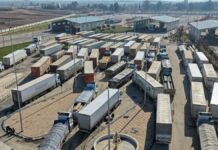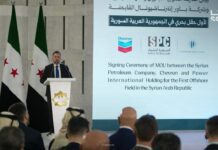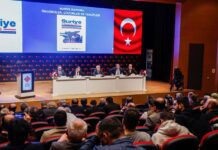
The ongoing Repelling the Aggression campaign by Syrian revolutionary forces has significantly shifted dynamics in northern Syria, as fierce battles continue in Aleppo and Idlib provinces. The offensive, initially launched as a response to Assad regime attacks on civilians, has expanded as regime forces retreat, eliciting varied reactions from international actors and analysts.
The Kremlin has condemned the campaign, labeling it a “violation of Syria’s sovereignty.” Russian presidential spokesman Dmitry Peskov reiterated Moscow’s support for Assad, urging the regime to “restore constitutional order” swiftly. “We call on Syrian authorities to impose control as soon as possible,” Peskov stated during a press conference.
Russian Foreign Ministry spokeswoman Maria Zakharova accused Western powers, particularly the US and UK, of sowing chaos in Syria. She claimed that their actions have facilitated “armed and terrorist groups” while describing US military presence in Syria as “groups of criminal militants who steal Syria’s wealth.” Zakharova added that Russia “fully supports [Assad].”
Russian analysts, however, have expressed concerns about the capabilities of Assad’s military. Anton Mardasov, a non-resident scholar at the Middle East Institute (MEI), stated, “This should serve as a stark reminder to Assad of his actual capabilities, as his power has only survived thanks to Russia, Iran, and Hezbollah — all of which are currently preoccupied with their own challenges.” Mardasov noted that Assad’s military is unprepared for modern warfare and has been more focused on trading and taxation than combat readiness.
Mardasov warned that continued revolutionary advances could damage Russia’s reputation. He suggested Moscow might resort to deploying its Africa Corps, the successor to the Wagner Group, though such actions would require time to materialize.
Turkey, which shares a border with the conflict zone, has reiterated its commitment to stability in Idlib and surrounding areas. The Turkish Foreign Ministry emphasized that maintaining calm near the border is a top priority for Ankara, criticizing recent regime attacks as undermining the Astana agreements.
Foreign Minister Hakan Fidan stated that while Turkey is not involved in the clashes in Aleppo it is “taking necessary precautions.” He emphasized that Turkey would avoid actions that could trigger a new wave of migration and criticized the US for its support of “terrorists” in Syria, warning without US support they would be removed in three days.
“Maintaining calm in Idlib and adjacent areas is critical,” the ministry went on to say, while also warning that Russian and regime attacks threaten stability and escalate tensions. Ankara highlighted that terrorist groups in Tal Rifaat and Manbij have exploited this instability to launch attacks on civilians and Turkish forces.
The Turkish Foreign Ministry attributed its support for the Repelling the Aggression campaign to its concerns over unfulfilled agreements to end terrorist presence in northern Syria. “Our commitment to Syria’s territorial unity and combating terrorism remains unwavering,” the ministry concluded.
Afghanistan’s Zabiullah Mujahid, Spokesman for the Islamic Emirate of Afghanistan said regarding recent developments that the Emirate congratulates the Muslims, in general and “Syrians in particular, on the liberation of Aleppo,” adding, “We congratulate the Ummah on this victory and affirm: sincerity to Allah, unity of ranks, humility, forgiveness, and mercy towards people will always remain the foundation of every Muslim victory.”
As revolutionary forces gain ground, reports indicate cracks within the Assad regime. Individuals close to the regime have allegedly fled Aleppo for Damascus, according to the Turkish news agency Anadolu. Unconfirmed reports suggest that Assad himself may have fled to Moscow, with the Halab Today channel citing unnamed sources for the claim.
Nick Heras, an analyst at the New Lines Institute for Strategy and Policy, remarked that revolutionary forces appear better positioned than the regime army, even with Russian support. “This should alarm Assad, as his forces are stretched thin and increasingly ineffective,” Heras noted.
The Repelling the Aggression campaign, spearheaded by the Commanding Military Operations (CMO), continues to gain momentum. Revolutionary fighters have liberated strategic areas, including the city of Saraqib, and most of Aleppo, Syria’s second-largest city. These gains underscore the regime’s waning ability to maintain control despite its reliance on Russian airpower and Iranian militias.
The Repelling the Aggression campaign has laid bare the fragility of Assad’s regime, as well as the limits of Russian and Iranian support. Analysts suggest that Moscow may eventually intensify its involvement, but logistical challenges and reputational risks complicate such moves.
Meanwhile, Turkey remains focused on safeguarding its border and preventing further destabilization. The international community continues to grapple with the implications of the conflict, with revolutionary forces determined to defend liberated areas and protect civilians.
As the situation develops, the offensive marks a pivotal moment in Syria’s ongoing conflict, with regional and international players carefully navigating their responses to the rapidly evolving dynamics. The coming weeks will likely determine whether the revolutionary campaign consolidates its gains or faces a renewed regime counteroffensive.








